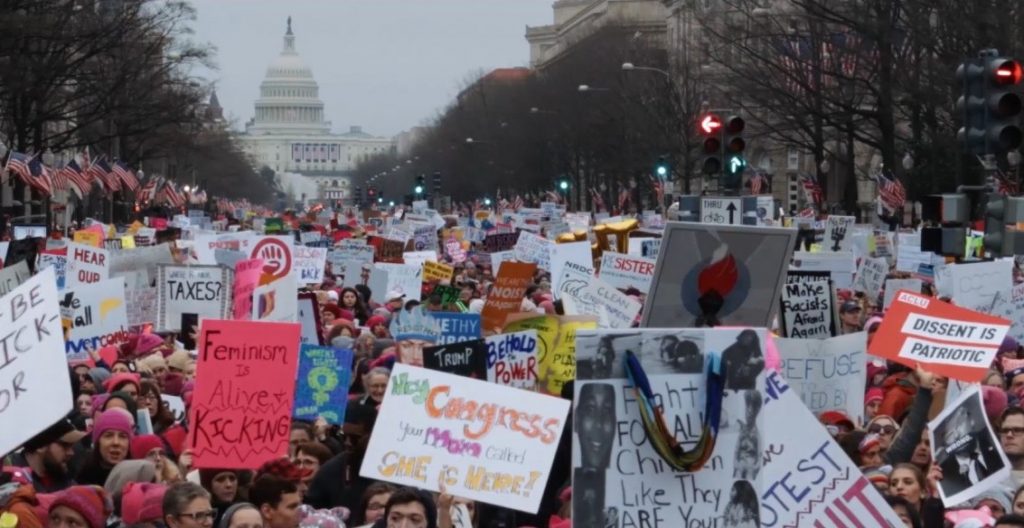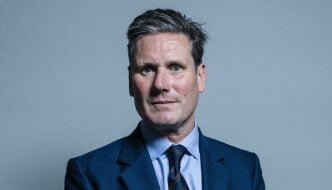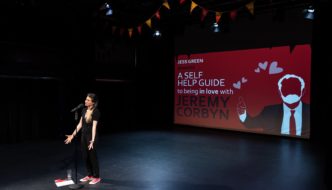We talk to Freedom For The Wolf director Rupert Russell @ Sheffield Doc Fest
June 12, 2017

Freedom For The Wolf, a documentary about the social movements to have sprung up across the West in recent years, is currently showing at Sheffield Doc Fest. We spoke to director Rupert Russell.
What moved you to make the film?
We started making it in 2014 and I think there was a general feeling of darkness around freedom and democracy even back then. You had the Snowden revelations previously and we were still, I think, in the ramifications of that. It was also evident that the Arab Spring hadn’t turned out to be this new wave of democratisation I think that most of us had hoped it would be, and we were also beginning to see in the United States, in addition to issues around surveillance, issues around police militarisation also coming into the foreground. So we were interested in issues around public apathy towards the concept of freedom in America. Why doesn’t the public care about these issues in ways that we think we might expect them too? Especially given that Americans perceive themselves as the land of the free and promote themselves as defenders globally of this idea.
Patrick the producer and I are both sociologists and we wanted to take a sociological approach to this question. So the difference people might not know is in philosophy and political science people want to get to the essence of what freedom is and what does it mean to be truly free but for sociologists it means what does freedom mean to be practiced? What does it mean for people’s everyday lives? By addressing this question in a global context we are trying to understand what might be happening globally. It was then luck that we hit the umbrella revolution in Hong Kong and then we were on a band wagon. That was a failed revolution and we wanted to see what happens when a revolution succeeds, so we went to Tunisia to do the Arab Spring story and by the end of our filming in Tunisia it was evident to us that the global story here was about illeberal democracy.
We kind of set off on this adventure expecting that everybody around the world would have a different idea of what freedom would be and increasingly what we were hearing was the opposite, that people’s complaints were the same: democracy not really functioning properly, the excess of influence of money in politics, police abuse of power and human rights, and so instead what you started to see what an emergence of common concerns around freedom because the nation state as it currently is isn’t doing what we want it to do globally and so people are reacting in the same way regardless of what culture they are from. After we did Tunisia, we wanted to do India—the world’s biggest democracy—which we knew also was becoming an illeberal democracy and the US was an obvious way to conclude.
Are there any other stories you would have liked to include that you perhaps didn’t have time for?
You wish you could put everything in. The Philippines is absolutely fascinating in terms of things we don’t understand. [Philippine president] Duturte is totally fascinating. He’s somebody who when he ran for president courted the gay vote in a hugely catholic country and really ran on an outsider-ish populist message that really ran against the catholic mores of the country. Duturte is more of a wildcard than even Trump is, so the Philippines is the country that I’m fascinated in terms of where it’s going to go. Is this level of violence sustainable? How much of it it is coming from the central government? Unlike Putin who is super anti-gay, anti-minority, Duturte has come around almost the opposite way by uniting really disenfranchised groups and formed this really popular coalition of minorities. Something we come back to again and again in the film is that people win elections. This isn’t a story about totalitarianism for the most part. This is really a story about people who are really good at winning elections and getting voters and so the question that we’ve got to figure out—I guess not just in this film but as free thinking people—is why is this so appealing and what can we do about it?
One of the things I really liked about the film was it’s use of animation. Was that something that was always in mind about presenting the narrative or is it something that came afterwards?
It came quite late into the process. We didn’t want to have voiceover in the film and didn’t want the film to feel like a lecture or like there was too much exposition and so we wanted to use visual metaphors to still get our point across. We had this great quote from Isaiah Berlin that “freedom for the wolf has often meant death for the sheep”. The wolf is this brilliant visual metaphor that we could use again and again and again, so no it wasn’t something which we initially decided upon but it was something we wanted to use as—to say it a bit pretentiously—non-discursive filmmaking ,where you’re not saying anything. I think is the best cinema. My favourite films are things like 2001: A Space Odyssey and Apocalypse Now, which are really movies about big ideas but the movies don’t necessarily articulate them. We definitely do articulate a lot of ideas but I’d rather limit it as much as I can for people to have these visual representations of ideas to get their teeth into.
The film features riot scenes and you were questioning some powerful entities. Were you ever scared whilst you were making the film?
Yeah the one moment was actually in the film. We were standing around during Trump’s inauguration in Washington DC and nothing happens at these protests, so I was standing around really bored and somebody set fire to a limousine and I thought ‘oooh there’s something to film’. So I ran over to this burning limousine with my camera and I heard someone behind me say “it’s gonna blow, it’s gonna blow’ and I then turned around and there was a wall of militarized police behind me. I was trapped between this burning car that might explode and police and so I just ran in the only option that was left and you can see this in the film. That was the only time I felt I was in trouble and didn’t know what to do.
Does that terrify you to a degree that your scariest moment is in the Western World, the first world, where we are allegedly supposed to be developed and civilised?
Naivety saves you in the other countries. What you don’t know is what makes you make bolder decisions so naivety definitely goes a long way.
It’s a really poignant time to premier the film in the UK. What are your thoughts on where the UK might be heading and what we can do about it?
That’s a great question. I’m not in the predictions business but I definitely think that the UK when it comes to human rights underneath both parties has actually been pretty poor. Britain likes to tout our history as, in part inventing the concept of rights, and I think we take comfort in that too much, and we don’t take notice of how our institutions are eroding. I think that one of the most frightening parts of British democracy is the extent of the surveillance state, which dwarfs what America has. We are one of the most monitored people in the world in terms of the use of surveillance technology and amount of CCTV cameras we have. I think that Britons are far too comfortable with this, too used to being surveyed constantly and it’s not until something goes wrong that we’ll suddenly realise how much we’ve given up.
Are you worried that we are going to learn these lessons the hard way in terms of parties putting these kind of proposals forward and still getting lots of votes? Do you think that there is that potential that things might need to get a bit worse in Britain before people wake up to it?
No I don’t think things have to get worse, I think they just need to be articulated. Things already are pretty bad and they are being articulated in bizarre ways, whether it’s voting for brexit and then voting for Corbyn I don’t think that the problems the UK have got have necessarily been clearly articulated by any political party or any political force. I think that Brits are characteristically unable to articulate their feelings and emotions and this is possibly what’s articulating itself in politics. When the manifestos got released it was really interesting as we’ve always been told it’s personality over policy and it reversed all of that conventional wisdom over 48 hours. People thought it was crazy to advocate renationalising the railways, but people hate the railways, and although nobody had articulated that yet they were like ‘Oh, we can vote for this? Ok great’. So I think Labour is articulating some of these frustrations, but then they don’t have a good record for human rights either, and hopefully the new leadership will change that. They have put some really prominent human rights campaigners at the forefront of the party and I really hope that continues to happen.
Personally I don’t want to get partisan or tell people who to vote for. Labour definitely has some work, but Theresa May saying that we need to rewrite our Human Rights is obviously extremely worrying. Though she might have bigger problems than repealing our laws. And American liberal democracy has been saved by Donald Trump’s extreme laziness. He wants to turn the US into a plutocratic state. He’s been very open about that, but he just can’t be bothered to do the hard work of repealing the first amendment, and so the same thing might happen with us. Human rights in the UK might have been saved by Brexit. They’ve got too much to do.
The film seems very hopeful towards activism as a valid antidote to illiberal politics. How much do you believe it can be?
I 100% believe in that. I think that it is about social movement. Social movements have an almost opposite relation to party politics in this sense. In that when a party is in power, the social movement in connection with that party atrophies. You see as the left atrophied under Obama but it’s also true on the right, the right atrophied underneath Regan and Bush. I think we have this thing that’s the opposite—when you’re out of power there’s not really a huge amount you can do except build social movements. In India recently you have these interesting partnerships that you see throughout history of Ghandi and Nehru, Martin Luther King and Lyndon Baines Johnson, and these people don’t always agree, they’re not part of the same organisation, but you have a movement that, because it’s outside of politics, can maintain its moral authority. I think it’s easy to lose that as soon as you get your hands dirty.
Our film is really about party politics, democratic politics failing people. The answer isn’t to do away with that system. It’s to organise and try and build a new system out of that and to not just pressure political parties but enter them as well. It’s important that people do enter political parties, that people do run for office. You’ll see now in the United States that scientists are running for office. I think that’s absolutely amazing and so people will splinter off from the social movement into party politics and we need to keep these two things running parallel to each other.
The challenge we’ve got with regards to liberal democracy is that people don’t necessarily know what an illeberal democracy is or realise that their rights are being taken away. Even if they did realise they don’t understand how important those rights actually are for their day to day lives, but it does crop up when people realise that they’ve lost those rights. I think that one of the things that’s important is the local issues, so it’s figuring out if its a local issue in Sheffield or London or Manchester and then connecting that to the broader rights you’ve got.
I think that’s how you get ordinary people to engage, and whether it’s people complaining about housing or the price of their utility bills, things that we don’t associate with human rights but usually they are. Behind every single local issue is probably some broader issue that’s at stake, whether it’s the erosion of public accountability or the erosion of our right to know what’s going on in public utilities or who gets housing or who’s giving out the zoning applications. So I think we shouldn’t just march for democracy but march for these small issues that people can relate to in their day to day lives, and build that into a broader narrative about how we can reclaim our democracy. What we want is for it to serve us and not the wolves.
Freedom for the Wolf premiers ta Sheffield Doc Fest on 12th June. Sheffield Doc Fest is one of the world’s most prominent documentary festivals running 9th- 14th June. Visit www.thestateofthearts.co.uk for more of our coverage of the 2017 festival.
Filed under: Film, TV & Tech, Politics
Tagged with: democracy, Doc Fest, documnetary, Donald Trump, Freedom for the Wolf, Jeremy Corbyn, Rupert Russell, Theresa May, trump



Comments